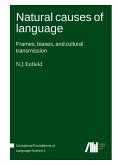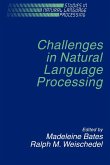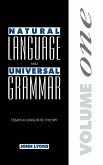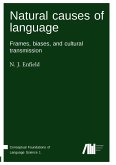Helmut Horacek
New Concepts in Natural Language Generation
Helmut Horacek
New Concepts in Natural Language Generation
- Gebundenes Buch
- Merkliste
- Auf die Merkliste
- Bewerten Bewerten
- Teilen
- Produkt teilen
- Produkterinnerung
- Produkterinnerung
This book aims to inform researchers with an interest in natural language generation about advances in the field. It is organised around four topics - system architectures, content planning, discourse planning and realisation in linguistic form - and it presents some of the most important works in this area of research.
Andere Kunden interessierten sich auch für
![Systemic Functional Grammar & Natural Language Generation Systemic Functional Grammar & Natural Language Generation]() Elke TeichSystemic Functional Grammar & Natural Language Generation206,99 €
Elke TeichSystemic Functional Grammar & Natural Language Generation206,99 €![Deep Learning for Natural Language Processing Deep Learning for Natural Language Processing]() Mihai SurdeanuDeep Learning for Natural Language Processing103,99 €
Mihai SurdeanuDeep Learning for Natural Language Processing103,99 €![Natural causes of language Natural causes of language]() N. J. EnfieldNatural causes of language14,99 €
N. J. EnfieldNatural causes of language14,99 €![Gradability in Natural Language Gradability in Natural Language]() Heather BurnettGradability in Natural Language128,99 €
Heather BurnettGradability in Natural Language128,99 €![Challenges in Natural Language Challenges in Natural Language]() Madeleine Bates / Ralph M. Weischedel (eds.)Challenges in Natural Language40,99 €
Madeleine Bates / Ralph M. Weischedel (eds.)Challenges in Natural Language40,99 €![Natural Language and Universal Grammar Natural Language and Universal Grammar]() John LyonsNatural Language and Universal Grammar158,99 €
John LyonsNatural Language and Universal Grammar158,99 €![Natural causes of language Natural causes of language]() N. J. EnfieldNatural causes of language8,49 €
N. J. EnfieldNatural causes of language8,49 €-
-
-
This book aims to inform researchers with an interest in natural language generation about advances in the field. It is organised around four topics - system architectures, content planning, discourse planning and realisation in linguistic form - and it presents some of the most important works in this area of research.
Produktdetails
- Produktdetails
- Verlag: Bloomsbury 3PL
- Seitenzahl: 338
- Erscheinungstermin: 17. Dezember 2015
- Englisch
- Abmessung: 240mm x 161mm x 23mm
- Gewicht: 672g
- ISBN-13: 9781474246415
- ISBN-10: 1474246419
- Artikelnr.: 42857885
- Herstellerkennzeichnung
- Libri GmbH
- Europaallee 1
- 36244 Bad Hersfeld
- gpsr@libri.de
- Verlag: Bloomsbury 3PL
- Seitenzahl: 338
- Erscheinungstermin: 17. Dezember 2015
- Englisch
- Abmessung: 240mm x 161mm x 23mm
- Gewicht: 672g
- ISBN-13: 9781474246415
- ISBN-10: 1474246419
- Artikelnr.: 42857885
- Herstellerkennzeichnung
- Libri GmbH
- Europaallee 1
- 36244 Bad Hersfeld
- gpsr@libri.de
Helmut Horacek works for the German Research Center for Artificial Intelligence and taught at Saarland University, Germany. Michael Zock is Emeritus Research Director of the French National Centre for Scientific Research, Aix-Marseille University, France.
Introduction Helmut Horacek and Michael Zock
Part I. Content Planning
1. Content Determination and Text Structuring: Two Interrelated Processes
Denis Carcagno And Lidija Iordanskaja
2. Explanation Strategies for KADS-Based Expert Systems Michael Sprenger
Part II. Text Planning
3. From Interclausal Relations To Discourse Structure - A Long Way Behind,
A Long Way Ahead Eduard Hovy
4. Organising Discourse Structure Relations Using Metafunctions Elisabeth
Maier and Eduard Hovy
5. From Constituent Planning To Text Planning Zuzana Krifka-Dobei and
Hans-Joachim Novak
Part III. Realization
6. How a Systemic Functional Grammar Works: The Role of Realization in
Realization Robin P. Fawcett, Gordon H. Tucker and Yuen Q. Lin
7. Head-Driven Bottom-Up Generation and Government and Binding: A Unified
Perspective Fabio Pianesi
Part IV. Systems
8. Decision Making Throughout the Generation Process in The Systems WISBER
And DIAMOD
Helmut Horacek
9. A Revision-Based Generation Architecture for Reporting Facts in Their
Historical Context Jacques Robin
Part V. Selected Topics
10. The Initial Specifications for Generation
Introduction: Helmut Horacek
A. The Initial Specifications for Generation: Robert Dale
B. 'Does Natural Language Generation Start From A Specification?': David D.
McDonald
C. Notes on 'The Initial Specifications for Generation': Dietmar Rosner
D. On the Generator Input of the Future: Eduard Hovy
11. Lexicalization
Introduction: Ernst Buchberger
A. Is Content Generation A One-Shot Process Or A Cyclical Activity Of
Gradual Refinement? The Case of Lexical Choice: Michael Zock
B. Lexical Choice and Lexical Preferences: Ehud Reiter
C. A Holistic View of Lexical Choice: Stephan Busemann
D. Ontology and Lexical Choice: Hans-Joachim Novak
Index
Part I. Content Planning
1. Content Determination and Text Structuring: Two Interrelated Processes
Denis Carcagno And Lidija Iordanskaja
2. Explanation Strategies for KADS-Based Expert Systems Michael Sprenger
Part II. Text Planning
3. From Interclausal Relations To Discourse Structure - A Long Way Behind,
A Long Way Ahead Eduard Hovy
4. Organising Discourse Structure Relations Using Metafunctions Elisabeth
Maier and Eduard Hovy
5. From Constituent Planning To Text Planning Zuzana Krifka-Dobei and
Hans-Joachim Novak
Part III. Realization
6. How a Systemic Functional Grammar Works: The Role of Realization in
Realization Robin P. Fawcett, Gordon H. Tucker and Yuen Q. Lin
7. Head-Driven Bottom-Up Generation and Government and Binding: A Unified
Perspective Fabio Pianesi
Part IV. Systems
8. Decision Making Throughout the Generation Process in The Systems WISBER
And DIAMOD
Helmut Horacek
9. A Revision-Based Generation Architecture for Reporting Facts in Their
Historical Context Jacques Robin
Part V. Selected Topics
10. The Initial Specifications for Generation
Introduction: Helmut Horacek
A. The Initial Specifications for Generation: Robert Dale
B. 'Does Natural Language Generation Start From A Specification?': David D.
McDonald
C. Notes on 'The Initial Specifications for Generation': Dietmar Rosner
D. On the Generator Input of the Future: Eduard Hovy
11. Lexicalization
Introduction: Ernst Buchberger
A. Is Content Generation A One-Shot Process Or A Cyclical Activity Of
Gradual Refinement? The Case of Lexical Choice: Michael Zock
B. Lexical Choice and Lexical Preferences: Ehud Reiter
C. A Holistic View of Lexical Choice: Stephan Busemann
D. Ontology and Lexical Choice: Hans-Joachim Novak
Index
Introduction Helmut Horacek and Michael Zock
Part I. Content Planning
1. Content Determination and Text Structuring: Two Interrelated Processes
Denis Carcagno And Lidija Iordanskaja
2. Explanation Strategies for KADS-Based Expert Systems Michael Sprenger
Part II. Text Planning
3. From Interclausal Relations To Discourse Structure - A Long Way Behind,
A Long Way Ahead Eduard Hovy
4. Organising Discourse Structure Relations Using Metafunctions Elisabeth
Maier and Eduard Hovy
5. From Constituent Planning To Text Planning Zuzana Krifka-Dobei and
Hans-Joachim Novak
Part III. Realization
6. How a Systemic Functional Grammar Works: The Role of Realization in
Realization Robin P. Fawcett, Gordon H. Tucker and Yuen Q. Lin
7. Head-Driven Bottom-Up Generation and Government and Binding: A Unified
Perspective Fabio Pianesi
Part IV. Systems
8. Decision Making Throughout the Generation Process in The Systems WISBER
And DIAMOD
Helmut Horacek
9. A Revision-Based Generation Architecture for Reporting Facts in Their
Historical Context Jacques Robin
Part V. Selected Topics
10. The Initial Specifications for Generation
Introduction: Helmut Horacek
A. The Initial Specifications for Generation: Robert Dale
B. 'Does Natural Language Generation Start From A Specification?': David D.
McDonald
C. Notes on 'The Initial Specifications for Generation': Dietmar Rosner
D. On the Generator Input of the Future: Eduard Hovy
11. Lexicalization
Introduction: Ernst Buchberger
A. Is Content Generation A One-Shot Process Or A Cyclical Activity Of
Gradual Refinement? The Case of Lexical Choice: Michael Zock
B. Lexical Choice and Lexical Preferences: Ehud Reiter
C. A Holistic View of Lexical Choice: Stephan Busemann
D. Ontology and Lexical Choice: Hans-Joachim Novak
Index
Part I. Content Planning
1. Content Determination and Text Structuring: Two Interrelated Processes
Denis Carcagno And Lidija Iordanskaja
2. Explanation Strategies for KADS-Based Expert Systems Michael Sprenger
Part II. Text Planning
3. From Interclausal Relations To Discourse Structure - A Long Way Behind,
A Long Way Ahead Eduard Hovy
4. Organising Discourse Structure Relations Using Metafunctions Elisabeth
Maier and Eduard Hovy
5. From Constituent Planning To Text Planning Zuzana Krifka-Dobei and
Hans-Joachim Novak
Part III. Realization
6. How a Systemic Functional Grammar Works: The Role of Realization in
Realization Robin P. Fawcett, Gordon H. Tucker and Yuen Q. Lin
7. Head-Driven Bottom-Up Generation and Government and Binding: A Unified
Perspective Fabio Pianesi
Part IV. Systems
8. Decision Making Throughout the Generation Process in The Systems WISBER
And DIAMOD
Helmut Horacek
9. A Revision-Based Generation Architecture for Reporting Facts in Their
Historical Context Jacques Robin
Part V. Selected Topics
10. The Initial Specifications for Generation
Introduction: Helmut Horacek
A. The Initial Specifications for Generation: Robert Dale
B. 'Does Natural Language Generation Start From A Specification?': David D.
McDonald
C. Notes on 'The Initial Specifications for Generation': Dietmar Rosner
D. On the Generator Input of the Future: Eduard Hovy
11. Lexicalization
Introduction: Ernst Buchberger
A. Is Content Generation A One-Shot Process Or A Cyclical Activity Of
Gradual Refinement? The Case of Lexical Choice: Michael Zock
B. Lexical Choice and Lexical Preferences: Ehud Reiter
C. A Holistic View of Lexical Choice: Stephan Busemann
D. Ontology and Lexical Choice: Hans-Joachim Novak
Index








